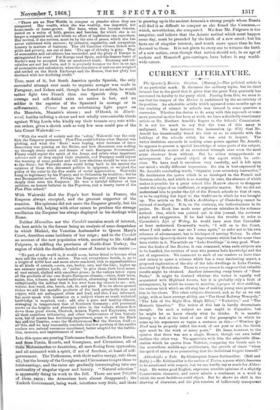CURRENT LITERATURE.
The Quarterly Review. October. (Murray.)—The political :track is of no particular mark. It discusses the ordinary topics, but its chief interest lies in the proof that it gives that the great Tory quarterly has recovered its loyalty to the party chief. Passing from this, we BOOM to see that the temper of the Review is embittered by the uncertainty of its position. An admirable article which appeared some months ago on the teaching of science in schools was termed in some quarters a surrender. Whether the desire to do away with this reproach or some more personal motive has been at work, we have a decidedly reactionary article on Mr. Matthew Arnold's Report to the Schools' Commission. It is not too much to say that the tone of this essay is malignant. We may instance the insinuation (p. 471) that Mr. Arnold has intentionally timed his visit so as to coincide with the holidays of tho schools which he was sent to inspect. The writer doubtless succeeds in making some points against Mr. Arnold ; he appears to possess a special knowledge of some parts of the subject, and is therefore secure of an occasional triumph over oven the most acute observer from without. But he either misapprehends or misrepresent the general object of the report which he criti- cizes. We have road it ourselves very carefully, and it left upon our mind a wholly different impression. Its aim is best expressed by Mr. Arnold's concluding words, "Organize your secondary instruction." Ho dosiderates the system which is so developed in the French and Gorman schools, and which is so wanting in ours, the absence of which makes it possible for a groat school like Harrow almost to disappear under the reign of an inefficient, or unpopular master. But we did not understand him to prefer the life of the French schools to that of ours, or to be anything but loyal to the traditions in which he was brought up. The article on Dr. Hook's Archbishop s of Canterbury cannot be accused of malignity. It is, on the contrary, too indiscriminate in its praise. Dr. Hook has made some grievous mistakes in the volumes noticed. One, which was pointed out in this journal, the reviewer adopts and exaggerates. If he had taken the trouble to refer to Cavendish's Life of Wolsey, ho would have soon that Cavendish at least understood Cromwell's words, "I will on to the Court, where I will make or mar ere I come again," to refer not to his own schemes of advancement, but to his hopes of serving Wolsoy. In other respects the Quarterly shows the improvement which has for some time been visible in it. The article on " Lake Dwellings "is very good. What- ever the faults of the Review, it can command, when such subjects are to be handled, the services of mon who possess both knowledge and the art of expression. We commend to such of our readers as have time and money to spare a scheme which has a very fascinating aspect, a proposed exploration of the site of the lake dwellings in Lake Prasias, described by Herodotus. There is every reason to suppose that valuable results might be obtained. Another interesting essay treats of "Deer Parks." It might be doubted whether the writer is equally well acquainted with Highland forests, but it is probably only a fault of arrangement, by which he seems to mention, apropos of deer-stalking, the curious trick which an old stag has of making young ones personate him in the chase. The other subjects discussed, and, as far as wo can judge, with at least average ability, are "The Great Railway Monopoly," "The Life of the Right Hon. Hugh Elliot," "Yorkshire," and "The Homeric Question." The writer of this last is hardly determinate enough. On such a subject no man ought to dogmatize, but he might let us know clearly what ho thinks. It is unsatis- factory to find at the head of one of the paragraphs in which he sums up his arguments so vague a sentence as this:—" Whether gm Iliad may be properly called the work of one poet or not, the Greek epic must be the work of many poets." He leans, however, to the opinion that there was not a single Homer, though our own belief inclines the other way. We appreciate with him the admirable illus- tration which he quotes from Welcker, comparing the Greek epic to the marvellous middle-ago architecture, the growth of times "when the spirit of union is so penetrating that the individual forgets himself."






























 Previous page
Previous page